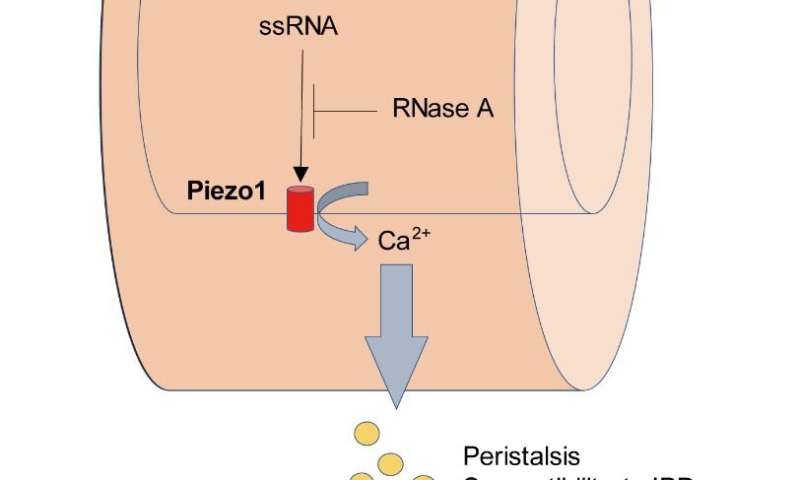
Gut enterochromaffin cells regulate gut and bone homeostasis via serotonin production. A recent report suggested that gut microbes regulate serotonin levels, but the underlying molecular mechanisms are unexplored. Here, Piezo1 is reported to be crucial for serotonin production from gut. Researchers discovered that bacterial derived RNA could activate Piezo1, leading to the production of serotonin from enterochromaffin cells, and that the RNA-Piezo1 axis could be an important target for treatment of bone and gut disorders.
In a new study published in Cell, “RNA sensing by gut Piezo1 is essential for systemic serotonin synthesis,” a research team led by Kenta Maruyama M.D., Ph.D. from National Institute for Physiological Sciences (NIPS) explored the role of Piezo1, a mechano-sensing receptor, in the sensing of bacterial RNA. They found that gut Piezo1 stimulated by bacterial RNA was pivotal for the production of serotonin, an important hormone that regulates gut and bone homeostasis.
Serotonin is critical for normal functioning of the central and peripheral nervous system to control emotion, peristalsis and blood pressure. The two production origins of serotonin include brain neurons and the gut enterochromaffin cells. Notably, serotonin does not cross the blood-brain barrier and 90% of the body’s total serotonin is secreted by enterochromaffin cells, establishing gut as the major source of peripheral serotonin. Most of the gut-derived serotonin is absorbed by platelets that release it after various stimulations. This then leads to the activation of several biological phenomena, such as gut peristalsis and bowel inflammation.
Interestingly, it has been reported that small fraction of gut-derived serotonin acts as a hormone. For instance, bone forming osteoblast function is inhibited by serotonin. Notably, gut specific deletion of tryptophan hydroxylase-1 (Tph-1), a synthase that generates serotonin from tryptophan, leads to the high bone mass phenotype. Despite the pleiotropic functions of gut-derived serotonin in various biological phenomena, the molecular mechanisms controlling serotonin production remain largely unexplored.
Sensation of the mechanical forces in the gut is critical for normal peristalsis, but their molecular mechanisms are elusive. The mechanosensitive Piezo1 cation channel was recently identified, which is expressed in various tissues and is critical for mechano-transduction in vascular development, red blood cell volume control and blood pressure homeostasis. Despite the importance of Piezo1 in mechano-sensation, its function in the gut remains to be explored.
Source: Read Full Article
